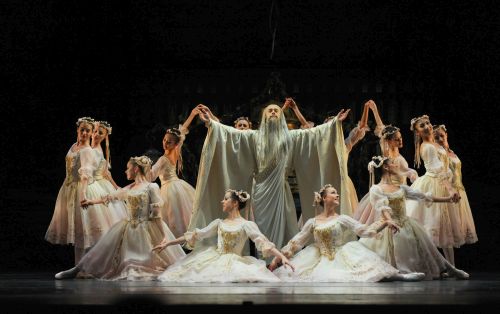 United Kingdom Delibes, Coppélia: Birmingham Royal Ballet, Royal Ballet Sinfonia, Koen Kessels (conductor), Edinburgh Festival Theatre, 7.2.2015 (SRT)
United Kingdom Delibes, Coppélia: Birmingham Royal Ballet, Royal Ballet Sinfonia, Koen Kessels (conductor), Edinburgh Festival Theatre, 7.2.2015 (SRT)

Principal Dancers:
Swanilda – Samara Downs
Franz – Jamie Bond
Dr Coppélius – Rory Mackay
Production:
Choreography: Marius Petipa, Enrico Cecchetti and Peter Wright
Production: Peter Wright
Scenery and costumes: Peter Farmer
Lighting: Peter Tiegen
Koen Kessels (conductor)
Royal Ballet Sinfonia
Swanilda – Samara Downs
Franz – Jamie Bond
Dr Coppélius – Rory Mackay
I’d never seen Birmingham Royal Ballet before tonight, but I found their Coppélia enchanting. It’s classical ballet done the old fashioned way and it gave me something not just to enjoy but to wallow in. For a start, the sets are marvellous, like something lifted straight out of an illustrated Grimm’s Fairy Tales, with depth and trompe l’oeil effects that hint at opulence without boasting of it. The costumes are delightful, too, and there are plenty of them: some of those ballerinas must need a whole wardrobe to themselves! Combined with the general sense of luxury, it all makes for an evening that speaks of a bygone age of storytelling, and the escapism is part of the appeal.
Sir Peter Wright’s staging dates back to 1995, but most of the choreography dates from the steps that Petipa himself designed for the ballet’s 1884 St Petersburg performance (later enriched by Enrico Cecchetti in 1894). It’s surprising how little it has dated. There’s something ageless about the movement, presumably because Petipa’s style was so enormously influential that it has helped to cement in the public’s mind the most enduring impression of what ballet is. There are additions from Wright himself, but the unity of the piece is remarkably striking, and it is brought to life brilliantly by both the principals and the corps. Petipa’s handling of the crowds shows an unfailing eye for geometry and symmetry, while Wright’s own take on the Act 1 Mazurka was pleasingly busy without being hyperactive. The divertissement of the final act was also very successful, with a Dance of the Hours that was delicately honed down to its finest details, but the solos were even more triumphant, crowned by a beautiful personification of Prayer by Delia Mathews, who seemed to find a weightlessness that exemplified the virtue she was enacting.
Samara Downs and Jamie Bond made a very fine pair of principals. Downs had a remarkable feel for the line of both the music and the dance, using every turn of her limbs to inhabit the grace of the role, but leaving enough mischief to remind us of Swanilda’s fiery temperament, too. Jamie Bond played the strutting hero very well, downplaying the more unpleasantly philandering aspects of Franz’s character. He brought extraordinary strength and physicality to the part, though, his powerful twirls and flexible mid-air heel-flicks seeming to play off one another in his character depiction. Rory Mackay hammed it up nicely as Coppélius, shrugging and hunching his way through most of the part, but eliciting some sympathy for him at the end.
The sounds emerging from the orchestra pit were as impressive as what was happening on stage. Koen Kessels kept the score moving without any undue lingering, but giving plenty of space to breathe during the more meditative solos, and the Royal Ballet Sinfonia did a very good job of bringing Delibes’ delectable score to life, the four horns sounding impressively Germanic. In short, this was a treat, and well worth catching if you can.
Birmingham Royal Ballet’s Winter tour is currently underway. For full details click here.
Simon Thompson